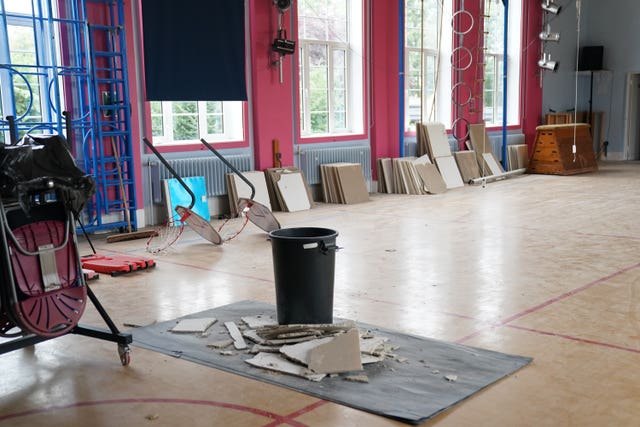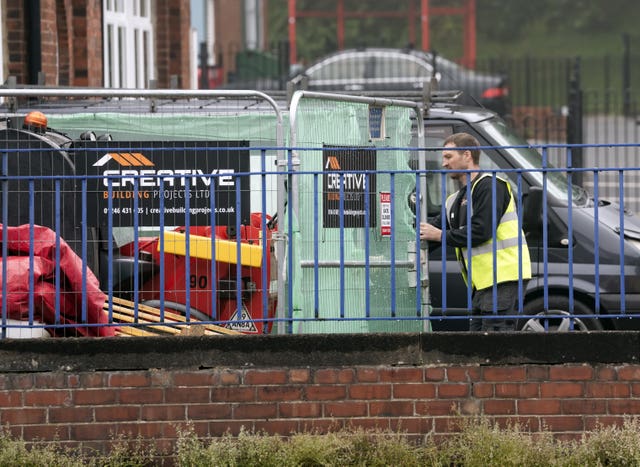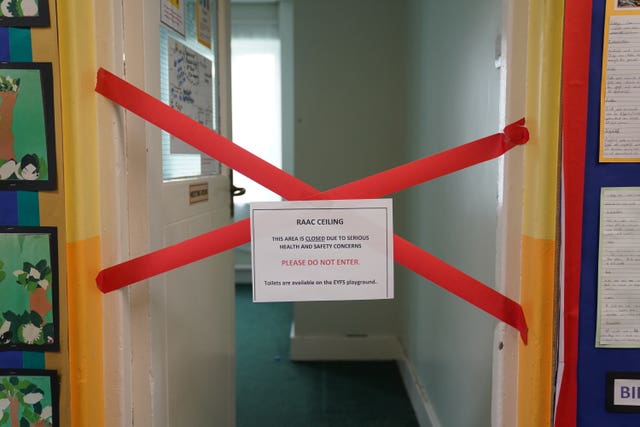More schools could be told they need to immediately shut classrooms because they are fitted with a concrete that could suddenly collapse, the schools minister has admitted.
Nick Gibb said on Friday that a collapse over the summer of a beam that had been considered safe sparked an urgent rethink on whether buildings with the aerated concrete could remain open.
Though not confirmed, it is estimated that around 24 schools in England have been told to close entirely because of the presence of reinforced autoclaved aerated concrete (Raac), the PA news agency understands.
The Department for Education (DfE) sought to dampen some of the anger by altering guidance to confirm that the cost of temporary and emergency accommodation will in fact be covered by the Government.
Some 104 schools and colleges have been told by the DfE to partially or fully close buildings just as pupils prepare to return after the summer holidays.

But Mr Gibb conceded that more schools could be told to make closures as evidence-gathering continues over the presence of the concrete.
“There may be more after that as these questionnaires continue to be surveyed and we continue to do more surveying work,” he told GB News.
But Mr Gibb insisted pupils and parents should not be apprehensive about the risk during the wait for the results.
“No, they shouldn’t worry,” he said.

“That’s a very cautious approach, so parents can be confident that if they’ve not been contacted by their school it is safe to send children back into school.”
Officials believe that only a “small number” of further schools will be told to make closures in the coming weeks once the surveyors complete their inspections.
Mr Gibb insisted “we took the decision as soon as the evidence emerged” as ministers faced anger for telling schools of the closures only days before children start the autumn term.
He said “over the summer” they discovered a number of instances where Raac that had been considered to be low risk “actually turned out to be unsafe”.
The minister told BBC Radio 4’s Today programme that a “beam collapsed” that had no external signs it was a “critical risk”.
Ensuring children and staff are safe in education will always be my top priority
A statement on how we’re addressing Reinforced Autoclaved Aerated Concrete (RAAC) in schools and colleges 👇
Details here: https://t.co/IvduVmsdf2 pic.twitter.com/Z9tN1ubJ7a
— Gillian Keegan MP (@GillianKeegan) August 31, 2023
It was unclear whether the collapse took place in a school in England.
The minister said the official guidance was being altered after it triggered additional anger by suggesting schools will have to pay for rental costs for emergency accommodation.
“We’re going to clarify the guidance because of their misinterpretation, we are paying for those costs,” he told Today.
“If in the worst-case scenario a school does have to close and we put Portakabins into the grounds, all that cost will be covered by the department.”
On Thursday, the DfE said it had contacted the 104 more schools after 52 of the 156 educational settings containing the concrete took protective steps so far this year.

The department said a “minority” will need to “either fully or partially relocate” to alternative accommodation while safety measures are installed.
Space in nearby schools, community centres or in an “empty local office building” was recommended for the “first few weeks” while buildings are secured with structural supports.
Schools were told moving to pandemic-style remote education should be considered only as a “last resort and for a short period”.
Labour has demanded that the Government names all the affected schools.
Mr Gibb insisted schools were contacting affected families and told Today “we will publish a list”, but only once they are in a “stable place”.
Raac is a lightweight building material used from the 1950s up to the mid-1990s, but is now assessed to be at risk of collapse.
The DfE has been considering Raac as a potential issue since late 2018 but the timing of the decision to issue guidance just days before the start of term has angered unions.
National Education Union general secretary Daniel Kebede said: “It is absolutely disgraceful, and a sign of gross Government incompetence, that a few days before the start of term 104 schools are finding out that some or all of their buildings are unsafe and cannot be used.”

The possible presence of the concrete was being assessed in Scotland, Northern Ireland and Wales, where education is devolved.
The Welsh Government said councils and colleges have not reported any presence of Raac.





Comments: Our rules
We want our comments to be a lively and valuable part of our community - a place where readers can debate and engage with the most important local issues. The ability to comment on our stories is a privilege, not a right, however, and that privilege may be withdrawn if it is abused or misused.
Please report any comments that break our rules.
Read the rules here